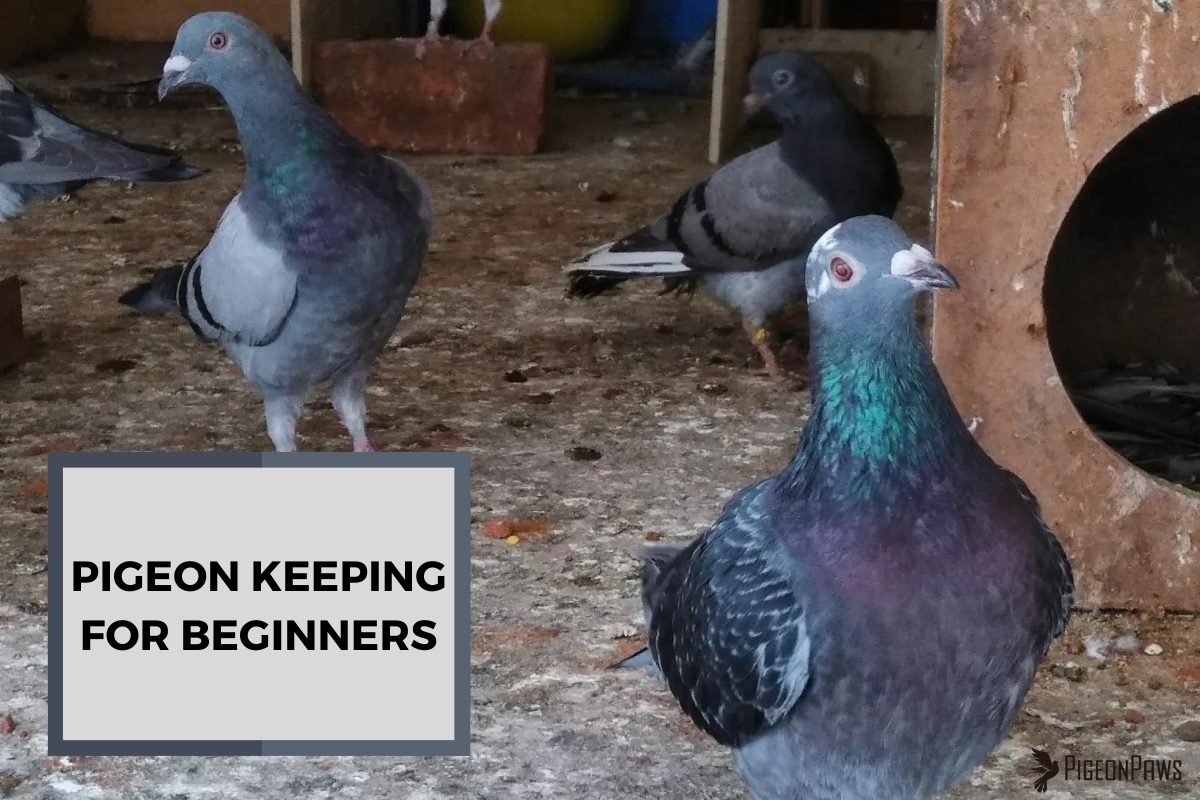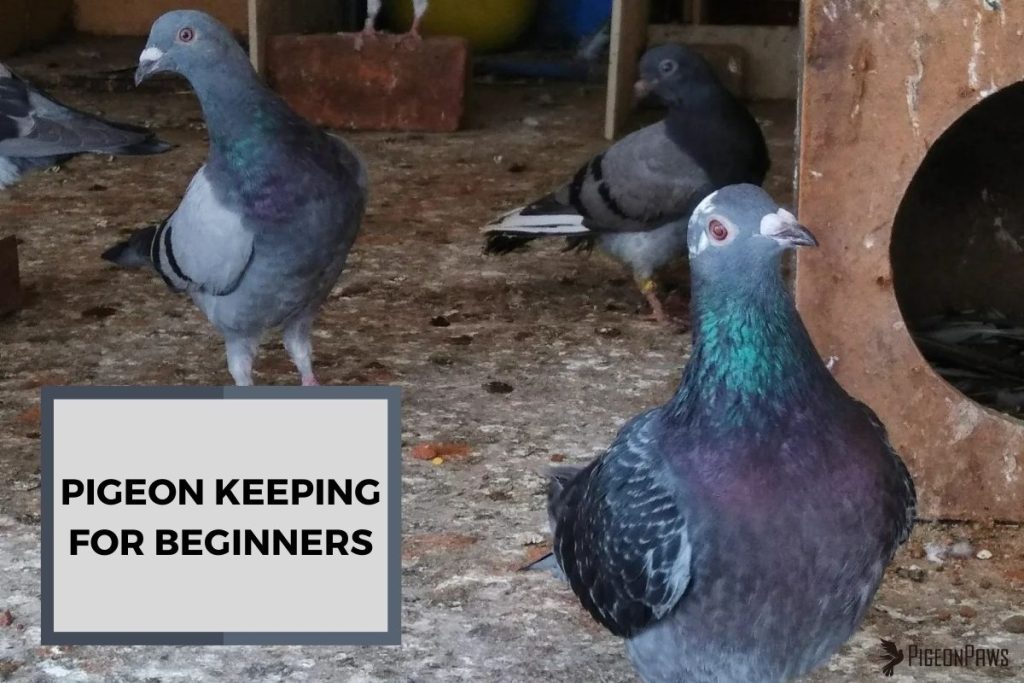Pigeon Keeping for Beginners, Everything You Need to Know

Upon awakening, it is common to hear the peaceful cooing of pigeons outside your window. These urban dwellers are known for their graceful flights through the sky and may have sparked your interest in pigeon breeding. If you are unsure of where to start, take action now to learn more about this fascinating hobby.
Pigeon keeping is a rewarding and engaging hobby that has been enjoyed for centuries. Whether you’re interested in racing, breeding, or just keeping pigeons as pets, getting started is easier than you might think.
Learn everything you need to know about keeping pigeons with my beginner’s guide. From selecting breeds to providing a comfortable home and proper care, I’ve got you covered. Let’s get started!

What Do You Need Before Getting Pigeons?
Before you rush out to buy a pair of pigeons, there are several essential items you must have in place to ensure their health and happiness. Here are some key things you need to consider:
Pigeon Cage
The first thing you need to consider is a pigeon cage. You can buy a pre-built cage from a pet store or build one yourself. The cage should be large enough for the pigeons to move around comfortably and have separate areas for feeding and nesting.
Food and Water
Like any other pet, pigeons need food and water to survive. They typically eat around 35-50 grams of food daily, so stock up on quality pigeon feed. Besides, they always need access to clean water, so invest in a water dispenser or bowl.
Perches
Pigeons love to roost and perch, so you should include perches inside your pigeon cage. The perches should be placed high enough to make the pigeons feel safe from potential predators.
Nesting Material
In order to breed pigeons successfully, it is imperative to provide them with appropriate nesting materials. As pigeons tend to construct their own nests, offering them a selection of materials such as straws, twigs, and similar resources is recommended.
This will allow pigeons to create a comfortable and secure environment for their offspring, leading to a more successful breeding process.
Cleaning Supplies
Keeping your pigeon cage clean is important for their health and hygiene. You’ll need cleaning supplies like a broom, dustpan, and disinfectant spray to keep the cage clean and sanitized.
How Do You Choose The Right Pigeons?
Choosing the right pigeons for your loft is crucial to ensuring a healthy and happy flock. Here are some tips to help you make the right choice:
Determine Your Purpose
Before you start looking for pigeons, decide on your purpose. Are you breeding for show or racing? Do you want pigeons as pets or for meat production? Once you have a clear idea, it will be easier to select the right breed.
Check for Health
Look for healthy birds with no signs of disease or deformities. Check for bright, clear eyes, smooth feathers, and a clean vent. Observe their behavior; are they alert and active? Avoid buying sick or unhealthy birds, as it can lead to the spread of diseases in your flock.
Check The Breed Standard
Each breed has a standard that describes its appearance, behavior, and characteristics. Make sure the bird you are selecting meets the breed standard. You can refer to books or online resources for breed standards.
Buy From a Reputable Breeder
Buying pigeons from a reputable breeder who can provide you with healthy and purebred birds is always better. Avoid buying from pet stores or unlicensed breeders, as they may not provide you with the right information or care instructions.
How Do You Care For Your Pigeons?
It’s time to start caring for your pigeons after you’ve chosen them and brought them home. Proper care and attention are crucial to ensuring your pigeons lead a healthy and happy life. Here are some important factors to consider when caring for them:
Housing
Your pigeons will need a safe and comfortable place to live. A pigeon loft is an ideal home for them. It should be large enough for them to move around freely, have good ventilation, and be kept clean and dry.
Feeding
A balanced and nutritious diet is recommended for pigeons to maintain their health and well-being. This can be achieved by offering a combination of pigeon feed, seeds, and grains. Fresh fruits and vegetables can also be included in their diet as a supplementary source of nutrients.
Water
Ensuring that your pigeons can always access fresh and uncontaminated water is imperative. It is recommended to replace the water daily and maintain the water container’s cleanliness to prevent any potential health hazards.
Health
Regular check-ups with a veterinarian are essential to ensure your pigeons stay healthy. Keep an eye out for any signs of illness, such as loss of appetite, lethargy, or unusual behavior.
Exercise
In order to promote optimal health and well-being, pigeons must receive regular exercise. Providing ample space for them to fly and engage in playful activities is recommended.
Additionally, you may want to consider taking them for brief walks or allowing them to engage in short flights. This will benefit their physical health and contribute to their overall happiness and satisfaction.
Is Training Pigeons to Do Tricks Suitable for Beginners in Pigeon Keeping?
Training pigeons to do tricks can be a suitable starting point for beginners in pigeon keeping. Learning how to train pigeon tricks helps establish a bond with these intelligent birds. By using positive reinforcement techniques, beginners can develop basic obedience skills in their pigeons, leading to a better understanding of pigeon behavior and more advanced training in the future. Embarking on this journey can be a fun and rewarding experience for both novice pigeon keepers and their feathered companions.
What Health Issues Should You Be Aware Of?
Like any other living creature, Pigeons are prone to various health issues. As a pigeon keeper, it’s important to be aware of these issues and take appropriate action to prevent and treat them. Here are some common health issues to look out for:
Respiratory Infections
Newcastle disease, avian influenza, and the pigeon herpes virus are respiratory illnesses that can affect pigeons. These illnesses have a rapid spread potential and can seriously harm the respiratory system. To stop the spread of illness, keep the living space for your pigeons clean and well-ventilated.
Parasites
Both internal parasites like worms and exterior parasites like mites and lice can infest pigeons. These parasites can result in various health complications, from skin irritation to intestinal troubles. Check your pigeons frequently for symptoms of parasites, and treat them as necessary.
Nutritional Deficiencies
Pigeons require a balanced diet to maintain good health. A diet lacking essential nutrients can lead to various health issues, from poor feather quality to weakened immune systems. Make sure they have access to a balanced diet and provide supplements as needed.
Injuries
It is important to note that pigeons are vulnerable to various injuries, ranging from collisions with objects to predator attacks. It is best to closely monitor them for signs of injury and provide any necessary care.
How Do You Train and Interact With Your Pigeons?
Pigeons are intelligent and social animals that can be trained to perform certain tasks or behaviors. However, proper training and interaction are crucial to building a strong bond with your pigeons and ensuring their well-being. Here are some tips on how to train and interact with your pigeons:
Establish a Routine
Consistency and routine are crucial for the well-being of pigeons. Establishing a set feeding schedule is recommended, ensuring they receive food at the same time each day. Additionally, maintaining a regular cleaning routine for their coop and providing fresh water will contribute to their overall health and happiness.
Positive Reinforcement
In order to encourage desirable behavior in your pigeons, it is recommended to utilize positive reinforcement techniques. This can include offering treats or verbal praise as a reward for behaviors such as returning to their coop or successfully performing a trick.
By consistently rewarding good behavior, you can foster a positive and enjoyable training experience for you and your pigeons.
Socialize Your Pigeons
Pigeons are gregarious creatures that thrive on social interactions. To ensure their well-being, offering them ample opportunities to socialize with members of their own species is imperative. This will help alleviate feelings of isolation and ennui in these birds.
Basic Training
Fundamental training, such as recall and perch training, can be instrumental in fostering a strong relationship and establishing trust with your pigeons. Commence by instructing them to return to their coop upon being summoned or to perch on your hand or shoulder.
Enrichment Activities
To maintain the mental stimulation and prevent boredom of your pigeons, it is recommended to provide them with toys or other forms of enrichment. You may consider offering perches or a small pool for them to splash in.
Such activities can contribute to the well-being of your pigeons and enhance their quality of life.
Conclusion
Pigeon keeping can be a fascinating and rewarding hobby for beginners willing to take the time and effort to care for their birds. You can create a thriving pigeon loft by ensuring you have the right setup, choosing healthy birds, providing proper care and attention, and monitoring their health.
With patience and consistency, you can also train your birds to become excellent racers or performers and form a strong bond with them. Remember to keep your loft clean and well-ventilated, and always prioritize your birds’ health and well-being.
Following these guidelines, you can create a safe and comfortable environment for your pigeons and enjoy the unique pleasures of keeping these intelligent and fascinating creatures.

